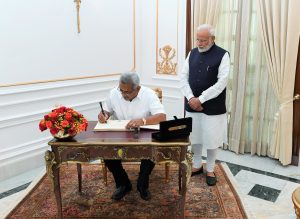The 25th Conference of Parties (COP25) is being held in Madrid, Spain from December 2 to 13. The conference, held annually under United Nations Framework Convention on Climate Change (UNFCCC), was originally planned to be hosted by Chile. But due to unrest, the venue was shifted to Madrid, Spain while the conference is still under the presidency of Chile.
At the conference, India will be stressing the fulfillment of pre-2020 targets by developed countries and that no additional burden be placed on developing countries post-2020.
India has been projecting itself as one of the prominent countries working to tackle the threat of climate change at a global level. India is one of the staunch supporters of the Paris Accord and also initiated the International Solar Alliance in 2015.
However, India needs to play a more proactive role in climate change. Climate change features in India’s vision for Indo-Pacific, but India could define its role in the area of climate change by focusing on its immediate neighborhood.
India’s relations with Sri Lanka can be considered from this point of view.
Sri Lanka’s newly elected President Gotabaya Rajapaksa visited India on November 29. This was his first foreign visit after becoming president and it was considered as a reset in India-Sri Lanka ties. During the regime of Mahinda Rajapaksa, Gotabaya’s brother, Sri Lanka established close ties with China. Relations between India and Sri Lanka became strained when a Chinese submarine and warship visited Colombo port in 2014. However, when in 2015 Maithripala Sirisena was elected as Sri Lankan president, he prioritized relations with India. For the past four years, bilateral relations between the neighbors had shown improvement. In 2017 Sri Lanka’s government rejected China’s request to dock its submarine at Colombo port because of India’s concerns.
But Gotabaya Rajapaksa’s election had concerned India since he is considered to be favorable toward China. However, he chose India for his first foreign visit. Further, Rajapaksa also said that he wants to renegotiate the terms of leasing the Hambantota port to China.
At a time when India is expected to play a proactive role in the security architecture of the Indo-Pacific region, it is important that India maintains cordial relations with its maritime neighbors. At the same time, in order to compete with China, India would need to diversify its relations with other countries. This is necessary in the view of current asymmetry between India and China in economic and strategic domains. For the purpose of diversification, soft power – which includes cultural and historical links – has long been one of India’s instruments of foreign policy.
In the future, it is important for India to prioritize climate change as one of the instruments of its foreign policy. Climate change diplomacy would benefit India in different areas. Climate change should not be just considered from the environmental and economic point of view; it also stands to affect strategic considerations. In the past few years, several countries in the Indo-Pacific region have witnessed a number of tsunamis, cyclones, and floods. Sri Lanka and India’s southern region experienced one of the worst tsunamis in 2004. These natural disasters cause disruptions in naval operations as well. As India focuses more on the maritime domain, it is imperative to address the challenge of climate change as it directly affects India’s strategic interests in the Indo-Pacific.
During President Gotabaya Rajapaksa’s visit, India announced a $400 million line of credit for infrastructure projects. Indian Prime Minister Narendra Modi also said that the $100 million line of credit that was offered previously would be utilized in setting up solar power projects in Sri Lanka. Recently Sri Lanka had invited bids for 10MW solar power projects. India is already operating in Sri Lanka in the field of renewable energy. India in collaboration with Spanish company Gamesa is engaged in generation of wind energy. There is also scope for India to operate in the area of electricity generation through LNG. Recent bids for solar projects also offer India an opportunity to expand its outreach in the field of renewable energy in Sri Lanka.
Climate change should become an important part of India’s Indo-Pacific strategy, but India needs to start focusing on its neighborhood to play a constructive role in the area of climate change. India has taken a step toward cooperating with Sri Lanka on climate change. This initiative needs to be pushed further for India to gain an advantage over China.
Niranjan Marjani is an independent journalist based in Vadodara, India. Follow him on Twitter @NiranjanMarjani

































